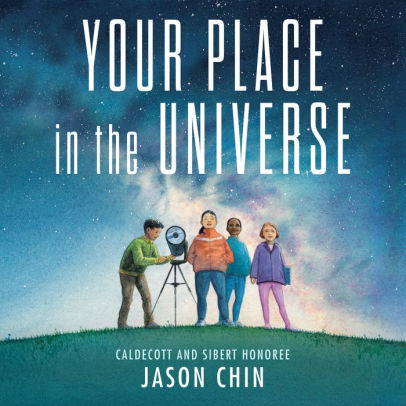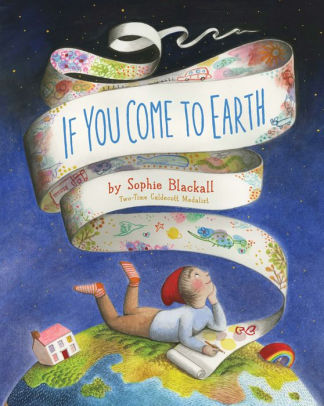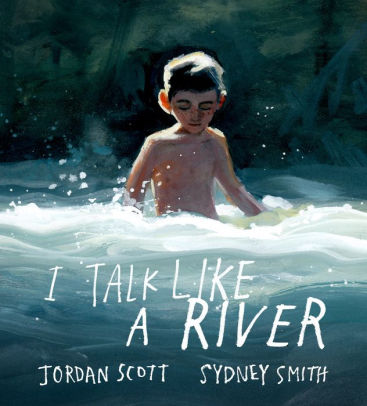Three critically-acclaimed picture books tackle big subjects like the size of the universe, the scope of humanity, and the power of words.
Your Place in the Universe by Jason Chin. Holiday House (Neal Porter Books), 2020, 38 pages.

Reading Level: Picture Book, ages 4-8
Recommended for: ages 6-12
How big is BIG? Well, in comparison with this book, the average eight-year-old is five times taller. But then, an ostrich, the tallest bird in the world, is twice as tall as an eight-year-old. And a giraffe is twice as tall as an ostrich, but dwarfs in comparison with a redwood tree, which in turn can’t hold a candle to the world’s tallest skyscraper. And on it goes, bigger and bigger, until we’re somehow looking down on the universe itself.
Comparative size is a fascinating subject for young minds (and older ones, too). Though the vastness of space makes us feel small, Jason Chin reminds readers that humans are the only known species able to contemplate hugeness and smallness and explore to the limits of their imagination. Four pages at the end of the text form a basic primer on astronomy. God does not come into this picture, but the book can lead to some fruitful conversations with older kids. Remind them that space and time are God’s creations, and can’t rule Him out. Someday He will rule them out, and preserve us.
Overall Rating: 4 (out of 5)
If You Came to Earth by Sophie Blackall. Chronicle Books, 2020, 80 pages.

Reading Level: Picture Book, ages 0-4
Recommended for: ages 2-5
If an alien came to visit our planet, what would he, she, or it want to know? The double-Caldecott medalist offers a world tour through the eyes of a representative child named Quinn. Quinn is an actual boy, an unusually perceptive and imaginative young person the author met on her travels. Many of the ideas and questions in this book came from him. The rest is a snapshot of humanity: where we live, what we eat, what we do for work and play. The artwork is beautiful: pages filled with people, flora, and fauna in dizzying array. While “Sometimes we hurt each other,” “It’s better when we help each other,” and everyone has something to contribute, whether a story or a song. The text is vague about the big questions: “We don’t know where we were before we were born or where we go when we die.” But that leaves an opening for some big answers. Theology aside, this is a lovely browsing book about the beauty of the earth and the people in it.
- Overall Rating: 4.5 (out of 5)
- Consideration: One double-page spread about families shows a same-sex couple, which is easy to overlook.
I Talk Like a River by Jordan Scott, illustrated by Sidney Smith. Holiday House (Neal Porter Books), 2020, 35 pages

Reading Level: Picture book, ages 4-8
Recommended for: ages 5-10
I wake up/ each morning/ with the sound of words/ all around me.
Our nameless protagonist has no trouble spelling them: P for pine tree, C for crow, M for the fading moon. But when he tries to say them, the P “grows roots inside my mouth and tangles my tongue,” the C “sticks in the back of my throat,” and the M “dusts my lips with a magic that makes me mumble.” As a result, he doesn’t talk much, and in school he dreads being called on. On one especially bad day, his dad takes him for a walk after school. Beside a swirling, whirling, churning river his dad says, “See how that water moves? That’s how you speak.”
A child who stutters or has trouble getting words out will relate to this simple story based on the author’s own experience. Children who don’t have speech issues should come to understand this phenomenon a little better. And parents will appreciate one wise father who knew what to say to his struggling child.
- Overall rating: 4 (out of 5)
Also at Redeemed Reader
- As evidenced by this post, picture books can tackle some big subjects. Here’s a roundup from 2018: Imagine, Love, and The Stuff of Stars.
- For size comparisons and little folks, see our review of You Are (Not) Small.
- More artistically stunning picture books by Jason Chin: Grand Canyon, Gravity, Water is Water (starred review).
- Sophie Blackall won the Caldecott medal last year for Lighthouse, which we never got around to reviewing but we highly recommend. She ran into a bit of controversy in 2015 with her historical picture book, A Fine Dessert. You can read about that controversy here.
- Paper Boy (a 2014 Newbery honor book) tackled the stuttering issue from an author who endured it.
We are participants in the Amazon LLC affiliate program; purchases you make through affiliate links like the one below may earn us a commission. Read more here.
Support our writers and help keep Redeemed Reader ad-free by joining the Redeemed Reader Fellowship.
Stay Up to Date!
Get the information you need to make wise choices about books for your children and teens.
Our weekly newsletter includes our latest reviews, related links from around the web, a featured book list, book trivia, and more. We never sell your information. You may unsubscribe at any time.
We'd love to hear from you!
Our comments are now limited to our members (both Silver and Golden Key). Members, you just need to log in with your normal log-in credentials!
Not a member yet? You can join the Silver Key ($2.99/month) for a free 2-week trial. Cancel at any time. Find out more about membership here.

